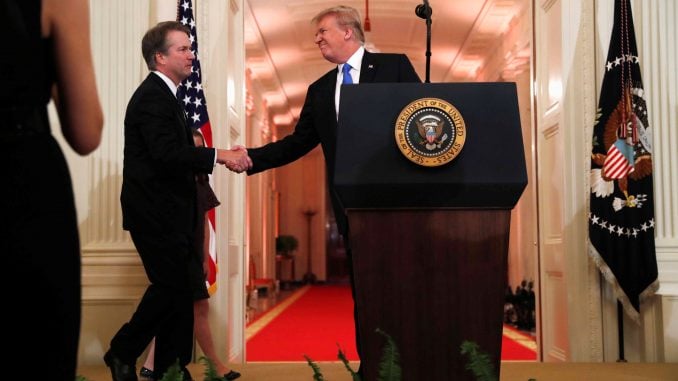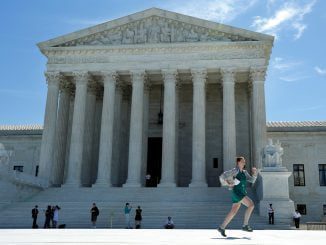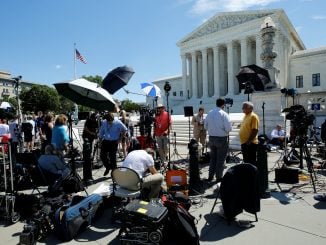
President Donald Trump’s Supreme Court nomination of Judge Brett Kavanaugh on Monday caused little change in the tone and rhetoric of the mainstream media talking heads or the special interest groups that were predisposed to loathe the eventual nominee. Many on the left are speaking from an apocalyptic perspective. Nina Totenburg — NPR Supreme Court correspondent and Justice Ruth Bader Ginsberg’s buddy — repeatedly called the retirement of Justice Anthony Kennedy (not the nomination of Kavanaugh) “the end of the world as we know it.”
Speaking of Ginsberg, many are already citing the now settled “Ginsberg Rule” when it comes to confirmation hearings for Supreme Court justices. The rule, simply, is that potential justices should refrain from statements that hint or forecast how they would rule on specific cases or legal theories. Justice Neil Gorsuch followed the rule in his confirmation hearings and was criticized by the left for a lack of candor and transparency.
The Ginsberg Rule came about through the ground rules set out for Ginsberg’s confirmation hearing by then Sen. Joe Biden who chaired the Senate Judiciary Committee in 1993. Current Senate Majority Leader Mitch McConnell gave Biden his own rule in 2016 when the Senate Republicans delayed action on the Supreme Court vacancy created by the death of Justice Antonin Scalia. Biden made the argument in the early 1990s that Supreme Court nominees in presidential election years should be considered after the election. Citing the Biden Rule, Senate Republicans waited out Obama nominee Merrick Garland and ended up with Trump’s first pick, Neil Gorsuch.
These rules will we cited early and often during the next few months as Kavanaugh moves toward confirmation. But, none of them are actually rules. Another set of nonbinding rules are what conservatives should be mindful of — “Rules for Radicals.”
Many evoked Saul Alinsky’s 1971 handbook on organizing — which has in its preface a quote acknowledging Lucifer as the first radical — during the Obama years. Prepare for Alinsky’s rules to play out in the Supreme Court battle that is just beginning in earnest.
Alinksy set out 13 essential rules for radicals, but rules four and five are currently on full display. Rule four says: “Make the enemy live up to their own book of rules. You can kill them with this, for they can no more obey their own rules than the Christian Church can live up to Christianity.” And rule five: “The fourth rule carries within it the fifth rule: Ridicule is man’s most potent weapon. It is almost impossible to counterattack ridicule. Also it infuriates the opposition, who then react to your advantage.”
Sen. Chuck Schumer is already demanding that the Republicans follow his interpretation of the Biden Rule, which he says means no Supreme Court nominee should be considered in any election year. Republicans, of course, disagree with Schumer’s interpretation, but his colorable argument still sets up the GOP for ridicule. The GOP counters that the Biden Rule was not about any election year, just a presidential election year.
The big source of agitation, and that is what the rules for radicals are all about, comes from Roe v. Wade which interpreted the U.S. Constitution to include an unwritten right to abortion. Democrats are unified in exclaiming that any Trump nominee — they were opposed to the pick before it was Kavanaugh — is unfit for the highest court because five conservative justices could overturn Roe. The rule, they argue, is that court precedent in the topics of abortion should be forever enshrined. Their logic is apparently that Supreme Court opinions are forever but, the text of the Constitution is ever-evolving.
Stare decisis, the latin maxim that courts should stand by things decided, will be the next rule that could subject conservatives to ridicule over potential threats to Roe.
Legal observers have speculated that Roe could be undermined in favor of more state control without actually overturning the precedent in the case. But, remember, rule nine of the rules for radicals is: “The threat is usually more terrifying than the thing itself.”
Neal Robbins is the publisher of the North State Journal.



